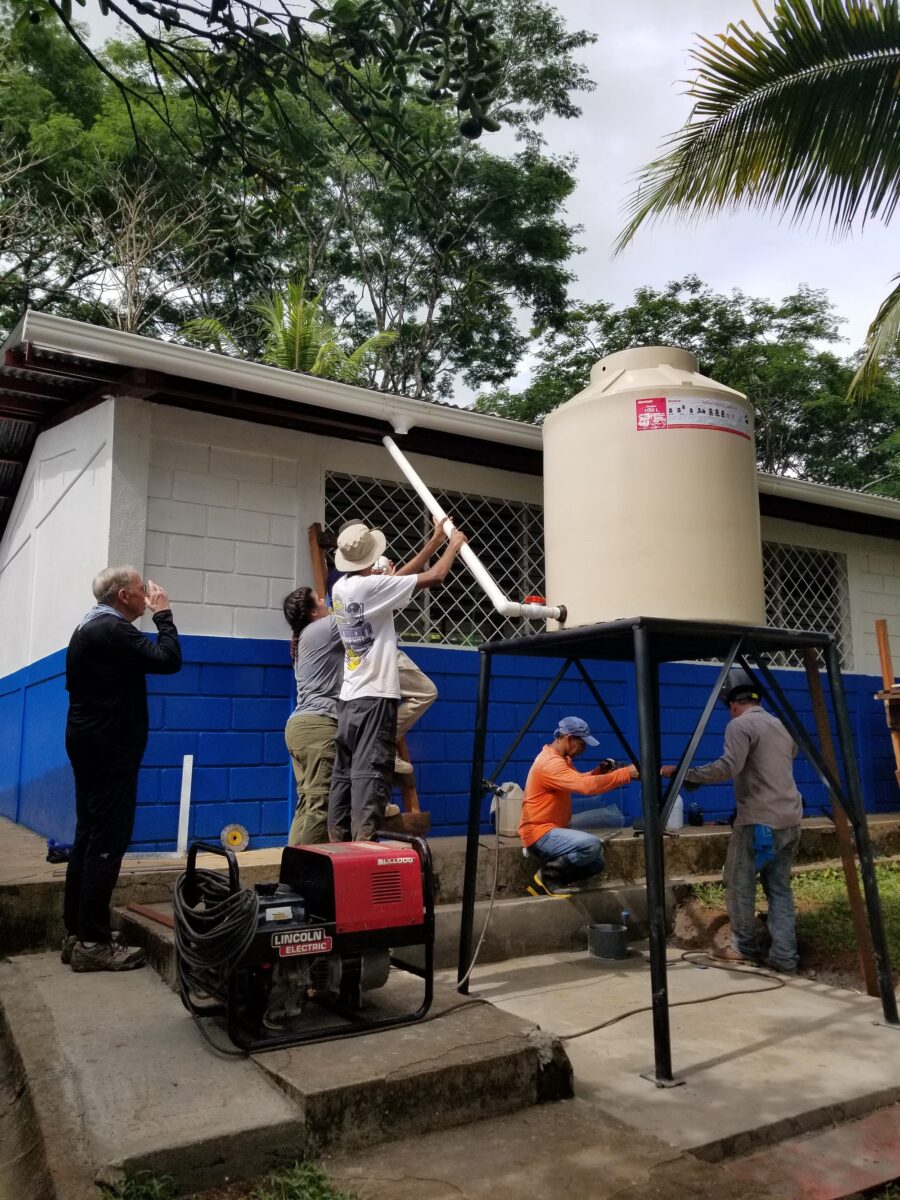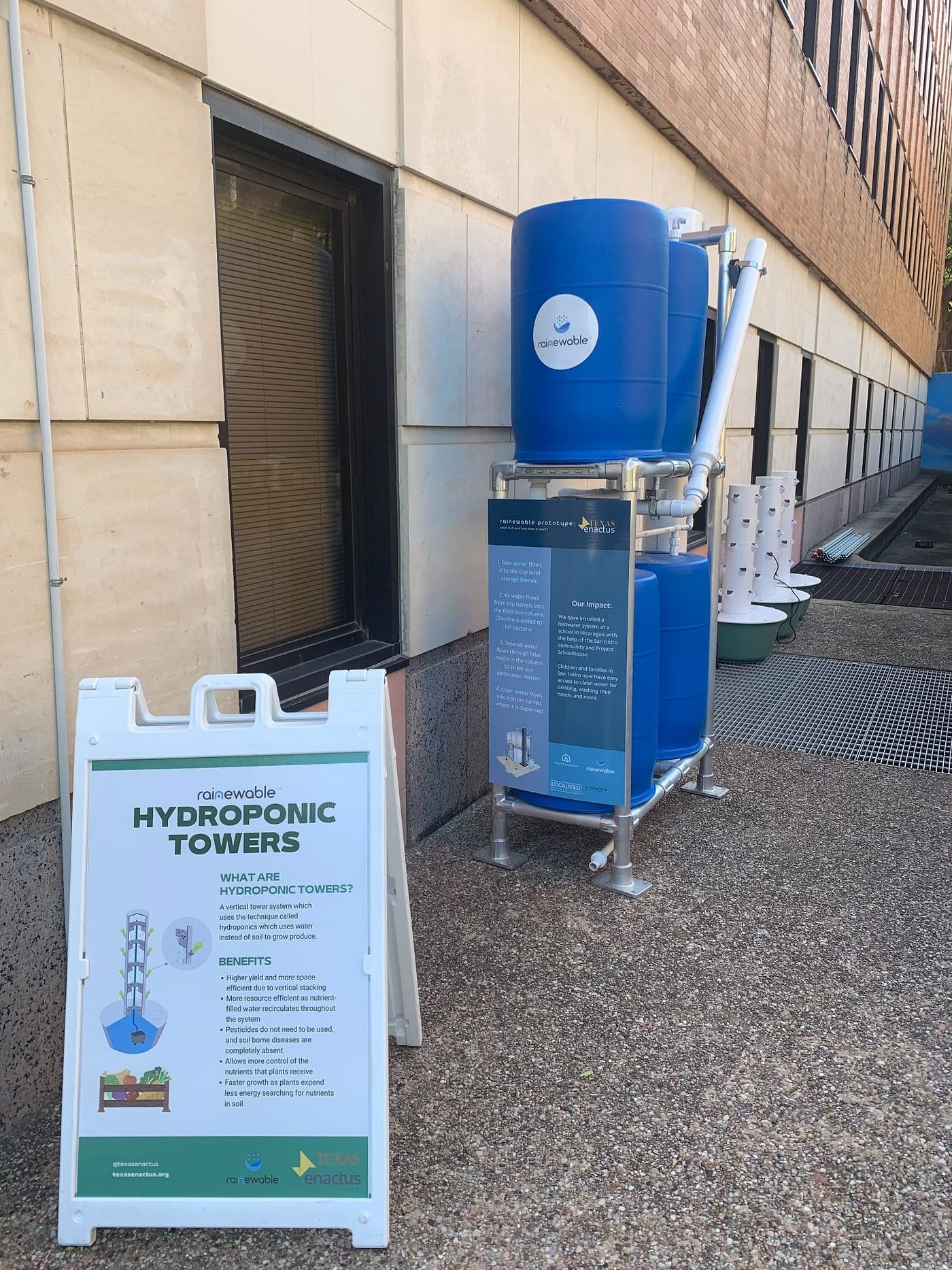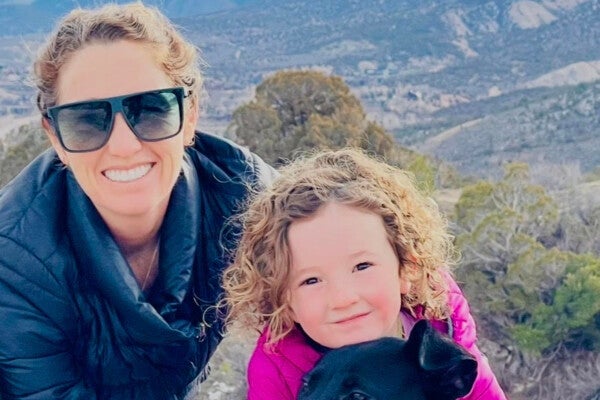Rainwater Reinvention
How McCombs students developed an innovative low-maintenance rainwater catchment system to assist people living in remote rainforest communities

By Alice Popovici
In August 2022, a group of McCombs students traveled to San Isidro, a small farming community in the rainforest of Nicaragua — where many houses are built on dirt floors and covered with tin roofs and the only source of water is a polluted river — with a plan to bring clean drinking water to its roughly 300 residents.
The students had been working on a rainwater catchment system that would provide safe drinking water for the village residents by collecting dirty water flowing from rooftops into a large barrel, filtering it, and pumping it into a second barrel of clean drinking water. The system was called Rainewable, and had been conceived and designed by UT students specifically for remote communities that receive plenty of rain, such as San Isidro. Initially, the students planned to build a prototype of the catchment system on the UT campus but this plan was postponed due to pandemic-related delays — so the team headed to Nicaragua with only ideas, designs, and a list of supplies.
When they landed in Managua and took their list of supplies to the local hardware store, they realized they had to shift course — and quickly.
“They basically redesigned the whole system on the spot in order to accommodate the materials that they could acquire locally,” remembers Dennis Passovoy, assistant professor of instruction in the management department at McCombs, who accompanied the students on the trip.
A promising idea
In fact, it was the adaptable, low-maintenance design of the rainwater catchment system that had caught Passovoy’s attention when two students pitched the idea in his Social Entrepreneurship Practicum class. After Naomi Sequeira, BS ’21 and Purvee Patel, BSA, BA ’21, pitched the project and worked as part of a team to develop a business plan, Passovoy helped get it off the ground. One of Passovoy’s first steps was bringing the project to Texas Enactus, a McCombs-based social entrepreneurship organization for which he is a faculty adviser. Texas Enactus is part of Enactus, a global nonprofit with chapters in 37 countries.

It was in that course that Rainewable began to take shape, with teams of McCombs students — some of whom were majoring in engineering — developing various facets of the project before passing it on to the next team of students. The students secured a partnership with Project Schoolhouse, an Austin-based nonprofit that works to improve access to education and clean water in remote communities in Nicaragua, and whose employees helped the students build the catchment system in San Isidro. They also received design assistance from the water engineering firm Localized Water Systems.
Meanwhile, funding from UT sources kept the project moving along — including about $16,000 in contributions from the Herb Kelleher Entrepreneurship Center and the Harkey Institute for Entrepreneurial Studies at McCombs, and the Hicks, Muse, Tate and Furst Center for Private Equity Finance, which went toward the trip to Nicaragua. The much-delayed rainwater catchment system prototype on the UT campus, which was finally completed this past spring, was funded by a $31,000 grant from the UT Austin-based grant program Green Fund.
Clean water and education
“We’re not just helping provide clean water, but at the same time we’re providing access to educational opportunities,” says Maria Cavazos, BBA ’26, who is vice president of outreach for Texas Enactus and worked to secure additional funding for the project.
Cavazos explains that in San Isidro, the task of fetching water from the river typically fell to young girls in the community, who would miss school as a result. In addition to making it easier for girls to attend school, Cavazos says Rainewable reduced the incidence of waterborne illness — as people could now wash their hands more frequently — and improved overall health literacy in the community.
These are some of the impacts Cavazos and three fellow McCombs students and Texas Enactus members described in the Enactus US National Exposition, held in Dallas in April 2023. With just weeks to prepare for the competition, Cavazos worked with Andrew Posey BBA ’25, Abhninav Yarlagadda BBA ’26 and Pranav Yedavelli BS ’26, to translate the lessons learned in Nicaragua into informative slides and anecdotes, capturing second place. The team’s success opened the doors to another opportunity: representing UT Austin in the Enactus World Cup competition in Utrecht, Netherlands in October 2023.

“The largest problem, especially going into the presentation, was that none of us had been to Nicaragua,” says Posey. As a result, he had to gather information quickly from people who had worked on the project. In the end, two things stood out to the jury, he recalls.
“The idea of clean water hit home with a lot of people,” Posey says. “And then also the idea that ours was a completely mechanical system.”
Lessons learned
Rainewable was not always meant to be a mechanical system; it had an electrical component meant to allow project engineers at McCombs to monitor the quality of the water, but the lack of necessary materials and infrastructure in Nicaragua made it impossible to implement. So the team adapted.

Yarlagadda, who joined Texas Enactus during his freshman year at McCombs because he was interested in social impact and sustainability — and plans to pursue product management after graduation — says his work with Rainewable offered valuable lessons in creativity and innovation.
“I think a huge part of Rainewable was really improving the lives of the people who lived in that village for the better, and thinking more about what issues they’re facing, and how we can really build a solution to maybe at least alleviate those issues,” Yarlagadda says. “In product management, we do a lot of the same thing. We really focus on the pain points and issues that our users are facing, and we really want to find innovative solutions.”
About this Post
Share:


